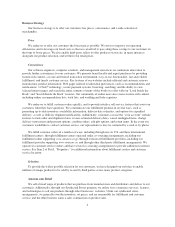Amazon.com 2003 Annual Report Download - page 20
Download and view the complete annual report
Please find page 20 of the 2003 Amazon.com annual report below. You can navigate through the pages in the report by either clicking on the pages listed below, or by using the keyword search tool below to find specific information within the annual report.We also may not be able to acquire or maintain appropriate domain names in all countries in which we do
business. Furthermore, regulations governing domain names may not protect our trademarks and similar
proprietary rights. We may be unable to prevent third parties from acquiring domain names that are similar to,
infringe upon, or diminish the value of our trademarks and other proprietary rights.
Policing unauthorized use of our proprietary rights is inherently difficult, and we may not be able to
determine the existence or extent of any such unauthorized use. The protection of our intellectual property may
require the expenditure of significant financial and managerial resources. Moreover, we cannot be certain that the
steps we take to protect our intellectual property will adequately protect our rights or that others will not
independently develop or otherwise acquire equivalent or superior technology or other intellectual property
rights.
Third parties that license our proprietary rights may take actions that diminish the value of our proprietary
rights or reputation. In addition, the steps we take to protect our proprietary rights may not be adequate and third
parties may infringe or misappropriate our copyrights, trademarks, trade dress, patents, and similar proprietary
rights. Other parties may claim that we infringed their proprietary rights. We have been subject to, and expect to
continue to be subject to, claims and legal proceedings regarding alleged infringement by us of the patents,
trademarks, and other intellectual property rights of third parties. Such claims, whether or not meritorious, may
result in the expenditure of significant financial and managerial resources, injunctions against us or the
imposition of damages that we must pay. We may need to obtain licenses from third parties who allege that we
have infringed their rights, but such licenses may not be available on terms acceptable to us or at all. In addition,
we may not be able to obtain or utilize on terms that are favorable to us, or at all, licenses or other rights with
respect to intellectual property we do not own in providing e-commerce services to other businesses and
individuals under commercial agreements.
We Have a Limited Operating History and Our Stock Price Is Highly Volatile
We have a relatively short operating history and, as an e-commerce company, we have a rapidly evolving
and unpredictable business model. The trading price of our common stock fluctuates significantly. Trading prices
of our common stock may fluctuate in response to a number of events and factors, such as:
• general economic conditions;
• changes in interest rates;
• conditions or trends in the Internet and the e-commerce industry;
• fluctuations in the stock market in general and market prices for Internet-related companies in
particular;
• quarterly variations in operating results;
• new products, services, innovations, and strategic developments by our competitors or us, or business
combinations and investments by our competitors or us;
• changes in financial estimates by us or securities analysts and recommendations by securities analysts;
• changes in Internet regulation;
• changes in our capital structure, including issuance of additional debt or equity to the public;
• additions or departures of key personnel;
• corporate restructurings, including layoffs or closures of facilities;
• changes in the valuation methodology of, or performance by, other e-commerce companies; and
• certain analyst reports, news, and speculation.
14
























